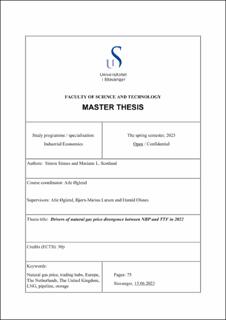| dc.description.abstract | The European gas market has undergone substantial transformations and fluctuations in recent years, resulting in a decoupling in natural gas prices between trading hubs in 2022. Specifically, the Title Transfer Facility (TTF) in the Netherlands and the National Balancing Point (NBP) in the United Kingdom experienced large deviations. Utilization of liquefied natural gas (LNG) as a supplement to pipeline imports has increased significantly after discontinuation of gas trade between Europe and Russia. The European gas market experienced constraints in supply and demand due to various factors, leading to elevated prices. The United Kingdom encountered a significant storage capacity crisis, necessitating the export of surplus natural gas to the Netherlands.
The study of the natural gas market implemented a combination of qualitative and quantitative methodologies, including the utilization of Vector Auto-Regression (VAR) models, correlation-, cointegration-, and Granger causality analysis.
As Europe sought to replace the Russian gas supply with LNG, the Netherlands' relatively low LNG import capacity hindered the country to fully exploit the expanded use of LNG. Furthermore, pipeline maintenance on the Netherlands' connections to Norwegian gas, coupled with the surplus gas in the UK, resulted in capacity constraints on the direct pipeline connection between NBP and TTF. The fundamental economic theory of supply and demand demonstrated how the shortage of supply in the Netherlands generated higher prices for natural gas in the country. The exhaustion of storage facilities in the UK contributed to limits on arbitrage, causing downward price spikes in the NBP compared to TTF, as predicted by storage theory. Data analysis revealed that although the European gas market traditionally functioned as a highly integrated and efficient market, it became disjointed and less efficient in 2022, thereby increasing market predictability.
The study's outcome was accordant to economic theories and findings from the conducted analysis. The findings emphasize the necessity for diversified natural gas supply sources, adequate storage capacity, and efficient transportation infrastructure to ensure a reliable and sustainable gas supply in Europe. In practical terms, the analysis results can potentially assist energy traders and analysts in making more informed decisions regarding gas contracts. By monitoring gas flow through connecting pipelines and analysing storage levels, they can make more accurate predictions about future price movements and adjust their trading strategies accordingly. | |
